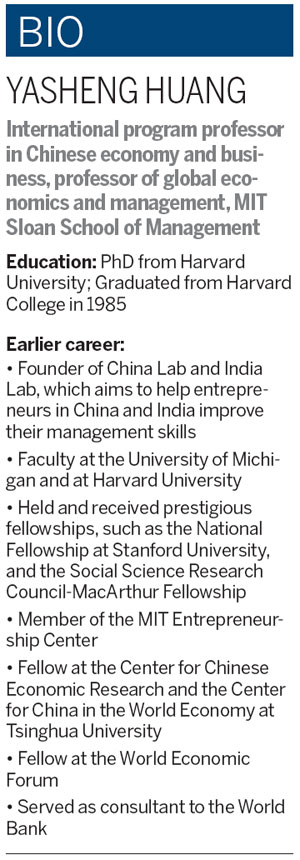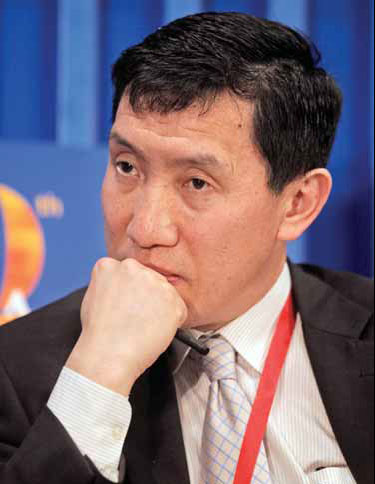A wary eye on the road ahead

|
|
China needs to spend more money on education than on railroads, highways, says MIT professor
Yasheng Huang, professor of political economy and international management at the MIT Sloan School of Management, believes that China's success has been more of human capital than anything else.
It is precisely this belief that prompted him to take on the additional job of training the next generation of Chinese women entrepreneurs this year. As part of the Goldman Sachs' 100,000 Women Initiative, the Sloan School is assisting Yunnan University in Southwest China in cultivating 300 women entrepreneurs for three years, with the first group of 45 students having started their classes since late March.
To help design the curriculum, Huang went to Yunnan earlier this year to find out the specific concerns of women entrepreneurs there. He found that human resources, leadership and marketing were the primary concerns.
"I learned that human resources management is a big task for many women entrepreneurs. They cannot keep people and don't know how to inspire employees," says Huang, also professor of International Program in Chinese Economy and Business at Sloan School of Management.
In fact, Huang's concern about human resources and education goes far beyond the entrepreneur level. He has been deeply worried that education, especially basic education, has not received enough attention from the government at various levels.
He laments the fact that of the bulk of the government's 4 trillion yuan ($634 billion, 495.6 billion euros) stimulus package went for infrastructure creation rather than on education and improving the income of ordinary people. In his eyes, education, rather than infrastructure, is fundamental in sustaining the long-term growth of a nation.
"When China had very little infrastructure in the 1980s and 1990s, the country was developing extremely fast. In the 1980s, the GDP was growing very fast, but people's income was growing even faster than the GDP growth," Huang says.
According to Huang, infrastructure is not the reason for economic growth, but a byproduct of the economic growth. In the case of the United States, the country built its massive infrastructure in the 1950s when it was already the biggest economy in the world. "It's not the case that poor countries should first build highways and then grow the economy," Huang says.
But that does not mean that Huang is all against infrastructure creation.

"My criticism is that there is excessive investment in infrastructure at the expense of the things that truly matter for the long run of economic growth, such as education. The Chinese government spends less money on education in terms of percentage of GDP than nations like India. My own view is that education is far more important than infrastructure," says Huang, founder of the China Lab and India Lab at MIT that helps entrepreneurs in the two countries.
Because of the excessive emphasis on building cities and infrastructure, basic education in China has not been improving as much as it should have. Also, much of the financial cost of basic education falls on Chinese families, rather than on the Chinese government, according to Huang.
In the past two decades, rising education cost has been a major concern for average Chinese, especially those from the poor rural areas.
Huang believes that the more the people spend on education and health care, the more they will want to save money and subsequently have little left for products and services. This is also why China has a big problem with low consumption to GDP ratio.
"During the financial crisis in 2008, China had a massive stimulus program and China was able to grow 9-10 percent, whereas India had no stimulus plan and was able to grow 8 or 9 or even 10 percent. You tell me which system is more efficient," Huang says.
Huang, author of the popular 2008 book Capitalism with Chinese Characteristics, worries about the excessive government role in the Chinese economy, which is often described in the West as State capitalism.
"It (State capitalism) is about the State running all the important financial institutions and maintaining a dominant position in industries and products that don't have public goods characteristics, such as running telecom services, steel and aluminum factories, owning all the land and using the power to evict peasants from their homes," says Huang, who grew up in China and whose father and grandfather were both veteran Communists.
According to Huang's study, the so-called guojin mintui (advance of State-owned enterprises and retreat of private businesses) is a huge problem. "It's absolutely clear that in the last three years there has been guojin mintui. The stimulus money has gone to the SOEs and their monopoly has increased rather than decreased," he says.
He says Nicholas Lardy, a well-known US economist, has been wrong in saying guojin mintui is not happening because his research was based on the wrong data and he was not aware that the Chinese government has revised upward the definition of small and medium-sized enterprises.
Calling himself a supporter of market economy and democracy, Huang says he is not ideological in that sense. "I think if you have accountability, that's fine. Village democracy is more important than democracy at the national level. The principle of democracy and market economy is the same in various countries, but there can be different ways of implementing these principles," he says.
Defending his sharp criticism of China on several occasions, Huang says: "When China has done right, I came out and said China has done right. Similarly when China has done wrong, I came out and said China was wrong. That's true with all the countries I study. I am a scholar. I take facts and take data very seriously."
He says he is optimistic about China in the long run. "China has better fundamentals than India and a lot of developing countries in sectors like education. China also has a very large and hard-working entrepreneur base.
"My criticism is that China must do much better than it has now," he says.
chenweihua@chinadailyusa.com
Today's Top News
- Xi calls for promoting volunteer spirit to serve national rejuvenation
- Xi chairs CPC meeting to review report on central discipline inspection
- Reunification will only make Taiwan better
- Outline of Xi's thought on strengthening military published
- Targeted action plan to unleash consumption momentum
- Separatist plans of Lai slammed































